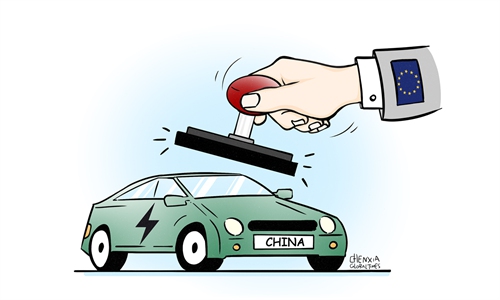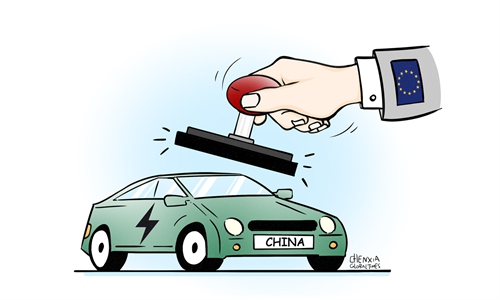
Illustration: Xia Qing/Global Times
The surge of electric vehicles (EVs) in the global market is an irreversible trend. Tesla's Model Y made history by becoming the first pure electric car to hold the title of the world's best-selling vehicle in 2023, UK-based research firm Jato Dynamics said in a recent report.The report revealed the top 25 best-selling vehicles globally in 2023, with no Chinese car models making the top 10 despite the overall rapid growth of Chinese EV sales. BYD's Qin, ranked 12th, emerged as the best-selling Chinese vehicle, with sales jumping 43 percent year-on-year to 473,000 in 2023. BYD's Song Plus ranked 19th and its Yuan Plus ranked 23rd.
These results have garnered a significant amount of attention. However, with Chinese EVs facing intense competition and challenges from Western companies, it begs the question of whether Chinese car brands can make their way into the world's top 10 best-sellers amid ongoing geopolitical and trade tensions.
Chinese auto brands have made significant advancements in recent years in terms of quality, design and technology, among other factors. Particularly in the new-energy vehicle sector, Chinese brands have demonstrated impressive growth and emerged as competitive players in the global market.
This can be seen in the success of brands like BYD and NIO, which have established a strong presence in both domestic and international markets through continuous technological innovation and strategic market expansion efforts.
However, simply achieving success in the domestic market is not sufficient for global success. When it comes to a global market presence, Chinese car brands still have considerable ground to cover in enhancing their influence and competitiveness.
There are still considerable gaps between Chinese brands and internationally renowned brands in aspects such as brand recognition, internationalization strategies, technological innovation capabilities and marketing. For example, Chinese car brands face a significant challenge in brand recognition compared with established global names like Volkswagen and Toyota.
To enhance their global presence, Chinese brands must continue to enhance brand awareness and reputation-building, increase investment in research and development to develop products for consumers in different regions and markets, and improve the global layout by providing a complete localization of products and services.
Moreover, with the changing global trade landscape, the increasing prevalence of protectionism has introduced uncertainty to the global expansion of Chinese EVs. Trade barriers, market access restrictions and other challenges have the potential to affect the competitiveness of Chinese EVs in Western markets.
Consequently, it is imperative for China's EV companies to bolster collaboration with international partners through technology exchanges, joint ventures and other strategies in order to mitigate trade risks and bolster their global competitiveness.
Despite these hurdles, it is not unattainable for Chinese car brands to further boost their global sales and competitiveness.
First, China boasts the world's largest auto market, providing a solid domestic foundation for Chinese brands. The country's robust industrial chain supports the growth of Chinese EV makers, offering ample room for development.
By focusing on the domestic market, Chinese brands can gain valuable experience and capital to pave the way for international expansion.
Second, while sales of EVs in developing countries may not currently match those of developed countries, China's EV brands possess great growth potential in emerging markets.
Third, technological innovation plays a crucial role in determining the competitiveness of automobile brands, an area where Chinese brands have shown promise, particularly in new-energy and smart connected vehicles.
Thus, continuously increasing research and development investment and accelerating the pace of technological innovation will be an important way for Chinese automobile brands to achieve sustainable development amid fierce competition.



